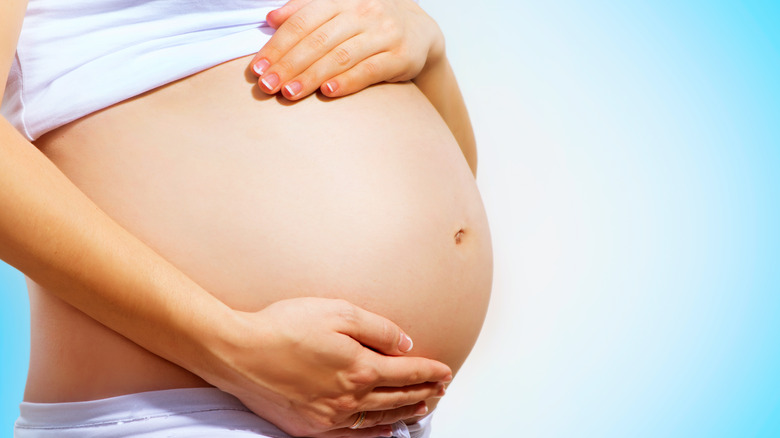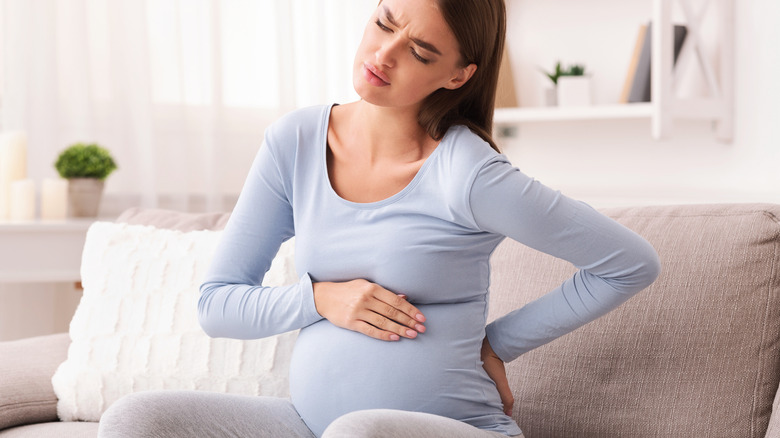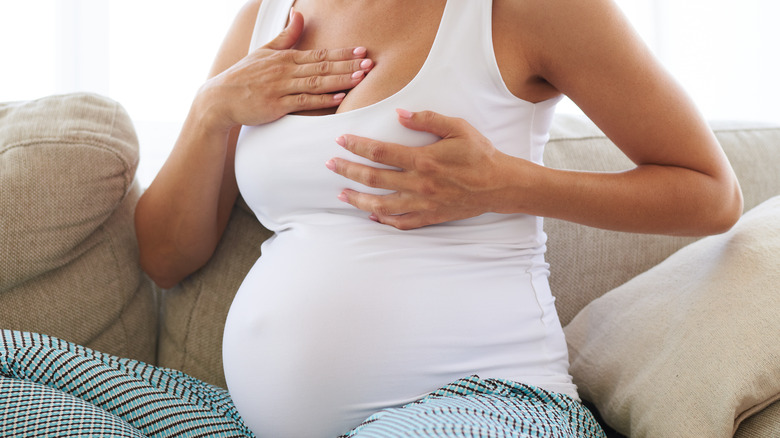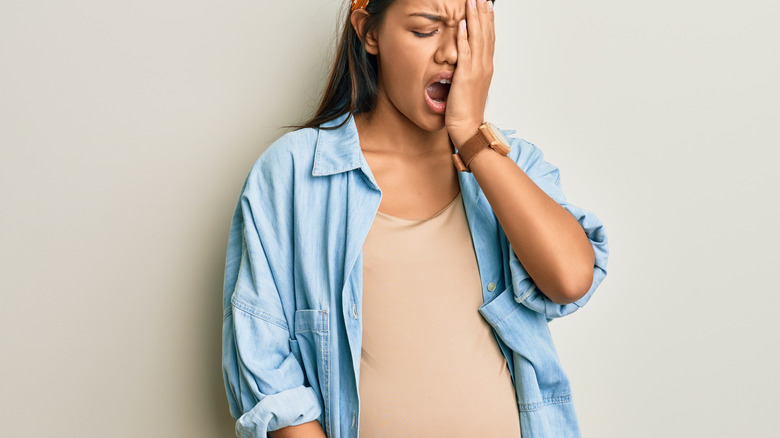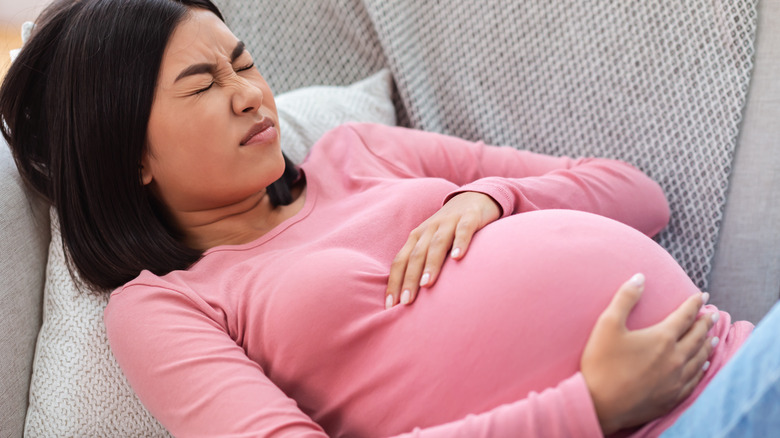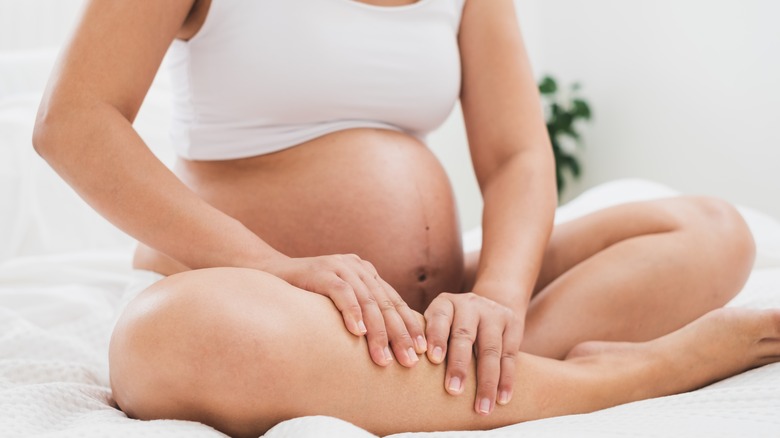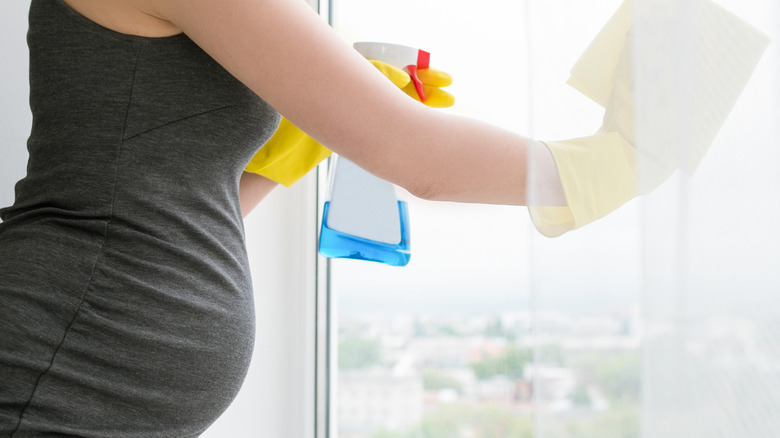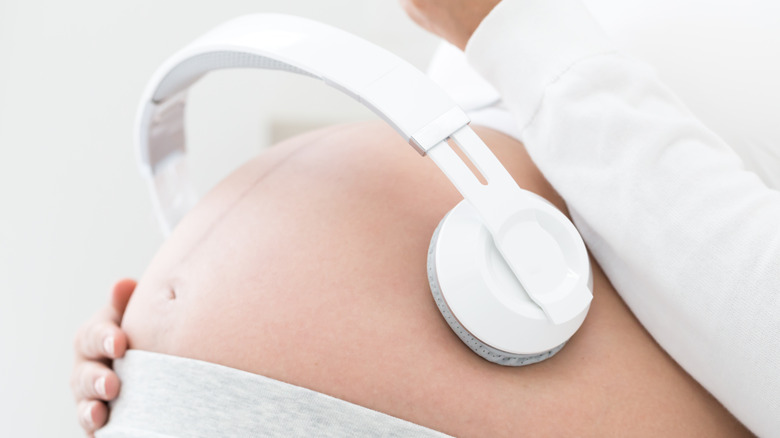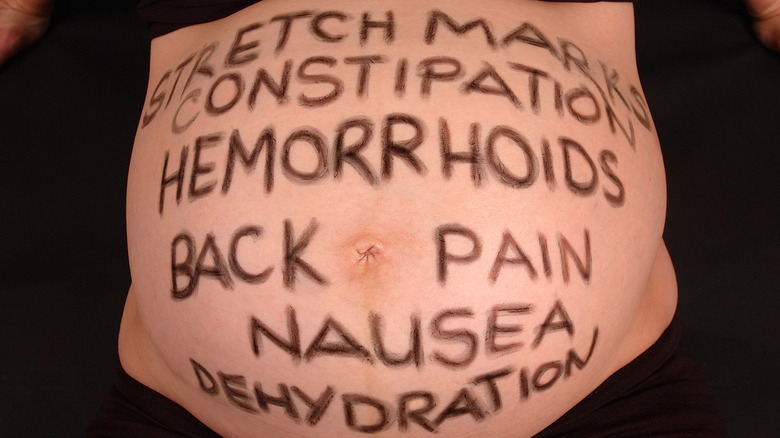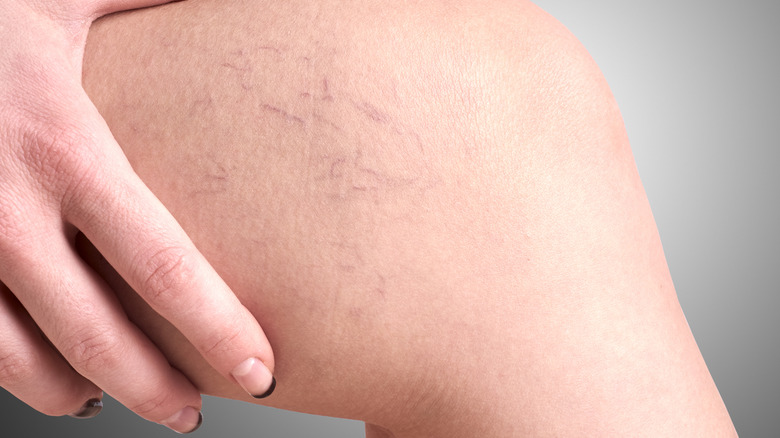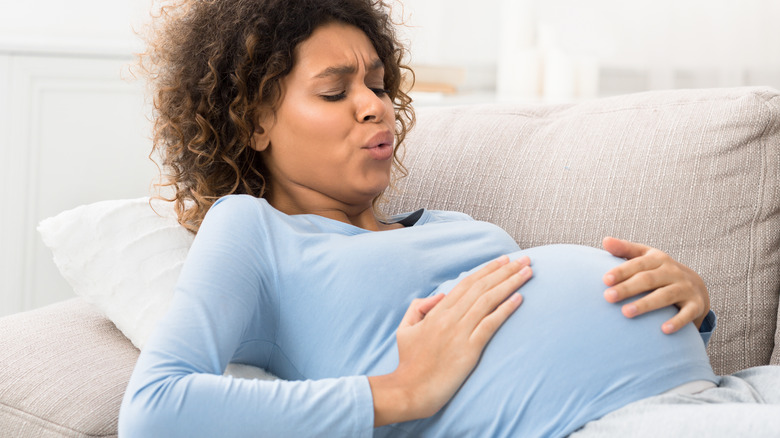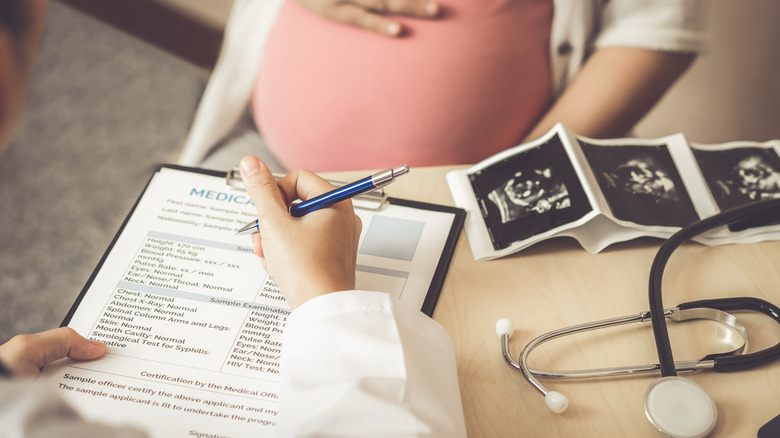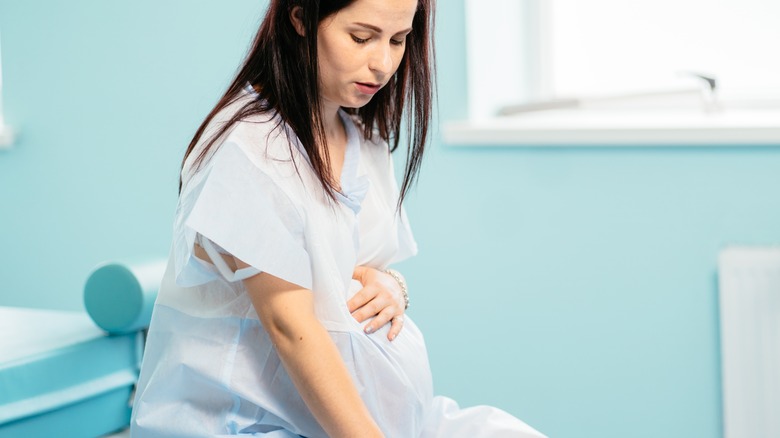What To Expect During The Third Trimester Of Pregnancy
Welcome to the third trimester — you're finally in the home stretch of your pregnancy. While you may feel as though your belly can't stretch any further, it's important to be patient, because your baby still has some growing to do. During the next three months, you'll probably start feeling the baby a lot more — and even experience a few more changes as your body starts getting ready to give birth.
But what exactly is the third trimester? The third trimester of pregnancy is counted from week 28 until you give birth, which can be around week 40 of your pregnancy, according to What to Expect. Once you get past the 40-week mark, you may be considered overdue, and if labor doesn't begin on its own, your doctor may decide to induce you.
A lot will happen during your third trimester, including backache, frequent urination, and those dreaded hemorrhoids. However, the third trimester may bring about some new symptoms, such as insomnia, crazy dreams, and leaky breasts (via What to Expect). These last few months of your pregnancy are vital, as your body continues to gear up for delivery. Hang in there — this is an exciting time and you'll be holding your newborn baby in your arms in no time. Here's what else you can expect during your third trimester of pregnancy.
Backache
A very common problem many expectant mothers have later in pregnancy is backache. Your expanding uterus, hormones, and the extra weight you're carrying may explain why your back may hurt (per American College of Obstetricians and Gynecologists).
According to the Mayo Clinic, you can ease some of your back pain or even prevent it by practicing good posture (like standing up straight with your shoulders back and relaxed), as well as adding regular physical activities into your daily routine. In addition to that, it is recommended that you wear the right foot gear that supports your arches, as well as wearing a maternity support belt. If you're still in pain, you can try sleeping on your side with a support pillow or applying a hot or cold compress to your back.
If all else fails, there's nothing better than a pregnancy massage to relieve your backache. If your back pain lasts longer than two weeks, consult your healthcare provider to rule out preterm labor or other infections.
Vivid dreams
If you've noticed that your sleep is being interrupted by nightmares or vivid dreams, you're not alone. According to a study in the Sleep Medicine Journal, an increase in "dysphoric dream imagery" — which means bad dreams with intense emotions — is quite common during late pregnancy.
Many expectant mothers report it's easier for them to recall their dreams more so than before they were pregnant (via the Sleep Foundation). They also say their dreams feel more realistic. If you're wondering why your dreams are so intense during this stage in your pregnancy, experts believe that changing hormones and disrupted sleep from pregnancy-related symptoms may cause you to get less REM sleep, which results in you remembering your dreams because you're waking up so much.
In order to deal with unpleasant dreams, Healthline suggests talking about them or journaling them. Discussing your feelings can help put your anxiety or fears into perspective. If you feel your dreams are causing you more distress than you can handle, talk to your doctor to find ways to help ease your anxiety.
Leaky breasts
You may notice many changes happening to your body as your due date nears, and leaky breasts are just another one you can add to the list. Even though you haven't given birth yet, your breasts are preparing your baby's first meal with something called colostrum.
Colostrum is a yellowish fluid that is packed with protein and antibodies that will feed your baby (via The Bump). Your baby will enjoy this superfood until your milk comes a few days after you give birth, says What to Expect. Your breasts leak this fluid during your last trimester because the hormone prolactin starts to gear up and get ready for milk production after your baby is born. If you see your nipples leak colostrum any time they're stimulated, then rest assured that this is completely normal.
If you notice more than a few drops of colostrum, or any blood or other discharge, then consider calling your doctor. Most of the time, though, if you see a few drops in your bra, it's just a sign of your body getting ready to feed your new baby.
Insomnia
If you're having a hard time falling asleep or staying asleep, you're not alone. According to the American Pregnancy Association, insomnia roughly effects about 78% of pregnant women.
Besides your growing belly appearing as an obvious cause of insomnia, back pain, heartburn, the frequent need to urinate, and vivid dreams may also be what's to blame for your lack of sleep during your third trimester. It can also be intensified if you have poor sleep habits, says certified maternity sleep consultant Rachel Mitchell (via The Bump). If you don't follow a regular bedtime routine — or if you like to watch TV or scroll through your smartphone right before bedtime — know that it can negatively affect how well you sleep.
To cope with insomnia during your third trimester, the APA suggests creating a better sleep environment by adjusting your thermostat to a temperate that makes you comfortable, as well as playing relaxing sounds that will help put you to sleep. If you still have a hard time falling asleep, try to get up and walk around, read a book, or eat a light snack.
Pain in your pelvis
Have you felt a sharp pain or jolt in your pelvis? If so, this is a common issue many pregnant women experience during their third trimester of pregnancy (per MedicineNet).
Pelvic girdle pain (PGP) or symphysis pubis dysfunction (SPD) is a pain that can be felt in your pubic bone or by your perineum, which is located between your vagina and anus. This feeling of electric shock or sharp shooting pain is sometimes referred to as "lightning crotch" and is not a sign of labor. According to Baby Center, the cause of this sudden shooting pain in your pelvis may be due to your growing baby's head putting pressure on your cervix and uterus. However, this is typically no cause for concern — while this pain may feel disruptive for a moment, it's not dangerous.
If it lasts longer than a few minutes and is accompanied by other symptoms like bleeding or fever, then it's vital that you call your doctor, because it can be a sign of something more serious.
Sciatica
As your baby continues to grow, your body will continue to go through physical changes. Another common issue many expectant mothers have later in their pregnancy is a pain in their sciatica.
Sciatic nerve pain is searing pain that travels from your sciatic nerve (which is the main nerve in your leg) down the back of your thigh (via WebMD). The reason this may happen to you during pregnancy is because of your growing uterus. When your uterus expands, it shifts your center of gravity and pinches the sciatic nerve, resulting in the pain you feel down your leg. While this pain can occur at any stage of your pregnancy, it often develops for most women during their last trimester, when additional weight is put on your joints and muscles.
A few things you can do to help relieve pain (via Everyday Health) is to lie on the side opposite of where you feel the pain. By lying on your side, you can alleviate some of the pressure you're feeling. Other suggestions are to use a hot or cold compress, wear a maternity support belt, and avoid standing for long periods. If the pain is severe, speak with your doctor to determine the right line of treatment for you.
Nesting
Have you felt the urge to organize and clean everything in your house? This pre-labor ritual is called nesting, and according to What to Expect, its nature's way of getting you ready to be a mother. This burst of energy that you may feel usually lasts a few weeks toward the end of your third trimester.
With that said, if you don't feel the need to organize, don't worry — that's perfectly normal, too. No one knows exactly why some pregnant women like to nest before their baby is born, but medical doctor Robin Kalish thinks it can offer women a sense of control during a high-anxiety time when everything feels out of their control (via The Bump). If you find yourself cleaning and re-organizing the nursery over and over, chances are you're in the midst of nesting.
To get the most out of this sudden burst of energy during this time, consider prepping freezer meals to have after your baby arrives, suggests Baby Center. Take this time to stock your pantry and freezer, and pack your hospital bag, too. Just make sure you're not overdoing it.
New fetal development
During the third trimester, each week brings something new in terms of your baby's development. At around 28 weeks, your baby will begin to open and close its eyes (via Pampers). At around 30 weeks, your baby will start to grow hair on its head. At around 34 weeks, your baby's head should start turning down near the birth canal.
During month 9, your baby will continue to grow and now be able to blink, turn its head, and respond if it hears a sound or sees a light, or if your belly is touched (via the Cleveland Clinic). By the end of week 36, your baby should be approximately 17 to 19 inches long and weigh between 5 ½ and 6 ½ pounds.
During weeks 37-40 — your final stretch — your baby's position should be head down as it prepares for birth. By the time you're ready for labor, your baby should be about 18 to 20 inches long, and should weigh about 7 pounds.
Hemorrhoids
Another common pregnancy symptom that many women experience in their third trimester is hemorrhoids. These swollen veins surrounding (or sometimes inside) your anus can make having a bowel movement quite difficult (via the Cleveland Clinic). If you feel itching or pain or see blood in the toilet, don't be alarmed. The added weight you're carrying, along with hormone changes, raise your chances of experiencing hemorrhoids. Constipation is another annoying symptom many pregnant women have to battle during pregnancy, which means the more you strain to go to the bathroom, the more added pressure on your anus.
To treat hemorrhoids and help ease any discomfort during pregnancy, the Mayo Clinic suggests soaking in a warm tub. If that doesn't work, then you can ask your physician to recommend medicated pads or hemorrhoid creams that are safe for pregnancy. Since constipation can be one of the main culprits of hemorrhoids, remember to drink lots of fluids and get an adequate amount of fiber in your diet.
Varicose veins
Can you see raised purplish veins on the inside of your legs or the back of your calves? If so, then you probably have varicose veins. This common yet harmless result of pregnancy happens to about half of expectant mothers (via WebMD). During pregnancy, the pressure from your uterus affects your main blood vessels, causing the blood to back up and resulting in your veins dilating and possibly feeling uncomfortable.
If you have swelling, aching, throbbing, or heaviness in your legs from varicose veins, then there are a few things you can do to help reduce the pain. The first thing you can try is to wear compression socks. These can be purchased online. If you want a stronger option, you can ask your doctor to write a prescription. In addition to that, you should try and keep your feet elevated as much as you can, take regular breaks from sitting and standing, and keep your legs uncrossed when sitting.
Most of the time, varicose veins will go away a few months after giving birth. If they don't and are still bothersome, talk to your doctor about any medical interventions they can suggest.
False contractions
During your third trimester of pregnancy, you may experience false labor pains, a.k.a. Braxton-Hicks contractions. According to a paper (via StatPearls Publishing), these contractions in your uterus typically aren't felt until later in your pregnancy, and are just your body's way of preparing you for real labor.
It's important to note that these are not true contractions, and do not indicate that labor is about to start. If you get Braxton-Hicks contractions, they may feel uncomfortable like menstrual cramps (via WebMD). The difference between these false contractions and real ones is they are not painful, have a regular pattern, and get stronger over time as true labor pains do. They also may disappear or stop when you change positions.
If you notice contractions becoming stronger or closer together, then call your doctor immediately because you may be going into preterm labor (per Medical News Today). Real contractions are painful, and can sometimes be felt across your belly and lower back. If you feel a consistent pattern starting to develop or your water break, then contact your doctor right away.
Frequent urination
In addition to hemorrhoids, varicose veins, and false contractions, you can add frequent urination to the list of symptoms you may feel during your last trimester of pregnancy.
You may have felt the need to pee a lot during the first trimester, and may have noticed it subside a little bit during the second trimester. For many women, though, it usually returns during the last few weeks of pregnancy (via Medical News Today). You can blame the extra pressure on your pelvis and bladder for why you're rushing to the bathroom so much during this third trimester. While there's no way to avoid going so much, there are a few things you can do to help manage how often you pee, says Pampers. To prevent waking up to urinate at night, try and limit your water intake before you go to bed. It's also recommended to avoid caffeine, which is known to make you go a lot.
If it's really bothersome, you can talk to your doctor to rule out any other medical conditions. But remember: Once the baby is born, these multiple trips to the bathroom typically subside.
Biweekly prenatal visits
During your third trimester, you will continue to have prenatal visits, just as you have been throughout your pregnancy. However, starting at around 36 weeks, they will become biweekly visits; then, as you are close to the end, they'll become weekly visits (via MedlinePlus).
During these visits, your doctor will continue to check your weight, blood pressure, and urine, as well as measure your abdomen to see how well the baby is growing. You may also receive a pelvic exam to see how far you're dilating. As far as ultrasounds and lab tests go, you shouldn't have any more in your third trimester, unless you are considered a high-risk pregnancy, have had prior pregnancy complications, or are overdue.
In between prenatal visits, your doctor may instruct you to pay close attention to your baby's movement (per Mount Sanai). You should feel your baby move every day, as well as watch for patterns and activity and inactivity of movement. If you don't feel the baby move, don't be alarmed. Try eating something or lying down. If you still don't feel anything, then contact your doctor.
Signs of labor
You're in your last trimester of pregnancy. Are you ready? Do you know the signs of labor? Knowing what to look for before your due date will help you feel ready for when the big day arrives.
According to March of Dimes, there are specific signs that will signal when you are in true labor. Those signs are contractions that are strong and close together, pain in your belly and/or back that doesn't subside when you move, bloody show (which is mucus discharge), and the most obvious sign, which is your water breaking. Another sign of labor is your cervix being dilated, which means it is beginning to open to prepare for the birth of the baby (via Mayo Clinic). When your cervix gets to 10 centimeters, that means you're fully dilated, and your doctor usually instructs you to start pushing.
If you think labor has started, and your contractions are so strong you can't walk or even talk, then it's definitely time to call your doctor.

